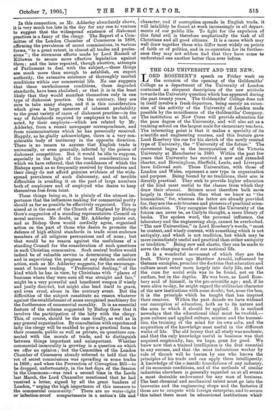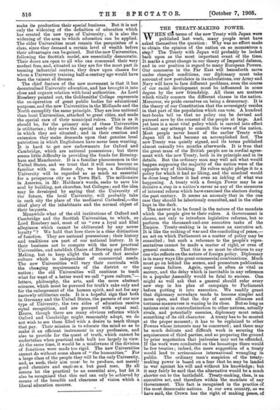It is a wonderful movement of which they are the
fruit. Thirty years ago Matthew Arnold, influenced by German examples, preached the doctrine that education and culture must enter more largely into daily life, and that the cure for social evils was to be found, not on the surface, but in the depths. He was born, as Lord Rose- bery said of himself, in the pre-scientific age ; and, if he were alive to-day, he might regard the utilitarian character of the new institutions with some doubt; but, none the 'less, it is the principle which he taught that has inspired their creators. Within the past decade we have widened our conception of education, both as to its nature and the area to which it should be applied. It is realised nowadays that the educational ideal must be twofold,— pure culture and applied culture, science and the humani- ties, the training of the mind for its own sake, and the acquisition of the knowledge most useful in the different walks of life. The old heresy that all study was academic, and that the only knowledge useful in business was that acquired empirically, has, we hope, gone for good. We know now that a trained intelligence is the first essential to any success, and that the most industrious worker by rule of thumb will be beaten by one who knows the principles of his trade and can apply them intelligently. A knowledge of the scientific foundations of any industry, of its economic conditions, and of the methods of similar industries elsewhere is generally regarded as at all events a most desirable endowment for any man of business. The best chemical and mechanical talent must go into the breweries and the engineering shops and the factories if these are to compete with foreign enterprise, and to secure this talent there must be educational institutions which make its production their special business. But it is not only the widening of the definition of education which has created the new type of University ; it is also the widening of -the area to which education can be applied. The older Universities must remain the perquisites of a class, since they demand a certain level of wealth before their advantages can be gained. But the new Universities, following the Scottish model, are essentially democratic. Their doors are open to all who can command their, very modest fees, and, situated as they are for the most part in teeming industrial centres, they draw upon classes for whom a University training half-a-century ago would have been the vainest of dreams.
The chief feature of the new movement is that it has decentralised University education, and has brought it into close and organic relation with local authorities. As Lord Rosabery pointed out, the Goldsmiths' College represents the co-operation of great public bodies for educational purposes, and the new Universities in the Midlands and the North exemplify the same principle. They are less national than local Universities, attached to great cities, and made the special care of their municipal rulers. This is as it should be, for the primary aim of these Universities is utilitarian ; they serve the special needs of the district in which they are situated ; and in their creation and extension they make demands upon that genuine local patriotism in which Englishmen have never been wanting. It is hard to get new endowments for Oxford and Cambridge, which are national possessions ; but there seems little difficulty in providing the funds for Birming- ham and Manchester. It is a familiar phenomenon in the United States, and we trust that it will soon become as familiar with us. Some day, we hope, a flourishing University will be regarded as as much an essential for a prosperous city as a Town Hall. The millionaire in America, in Mr. Haldane's words, seeks to save his soul by building, not churches, but Colleges ; and the idea may be developed by saying that the University of the future, the local University, will probably take in each city the place of the mediaeval Cathedral,—the chief glory of the inhabitants and. the normal object of their bequests. Meanwhile what of the old institutions of Oxford and Cambridge and the Scottish Universities, to which, as Lord Rosebery said, most of us "owe a loyal and filial allegiance which cannot be obliterated. by any newer loyalty " ? We hold that here there is a clear distinction of function. They are national possessions ; their history and traditions are part of our national history. It is their business not to compete with the new practical Universities, and establish Chairs of Brewing and Butter- Making, but to keep alight the torch of that secular culture which is independent of commercial needs. The new Universities will vary their curricula with the chaaging requirements of the district or the nation ; the old Universities will continue to teach what for want of a better word we call "pure culture,"— letters, philosophy, the arts, and the more abstract sciences, which must be pursued for truth's sake only and for the enlargement of the human spirit, and not for any narrowly utilitarian ends. It is a hopeful sign that both in Germany and the United States, the parents of our now type of University, the two sides of education receive equal recognition, and are pursued with equal zeal. Hence, though there are many obvious reforms which Oxford and Cambridge might reasonably adopt, we do not wish to see them filled with a desire to teach things that pay. Their mission is to educate the mind so as to make it an efficient instrument in any profession, and also to provide for the quest of truth, which cannot be undertaken when practical ends bulk too largely in view. At the same time, it would be a misfortune if the division of functions were made too rigid. The new Universities cannot do without some share of "the humanities." For a large class of the people they will be the only University, and, as such, their aim must be to produce, not merely good chemists and engiuee:s, but good men. By all means let the practical be an essential aim, but let it also be recognised that this end can only be achieved by means of the breadth and clearness of vision which a liberal education ensures. THE TREATY-MAKING POWER.
WHEN tht terms of the new Treaty with Japan were published last week, many people must have asked themselves the question : Why was no effort made to obtain the opinion of the nation on so momentous a step ? The Treaty with Japan will probably be looked. back upon as the most important event of the time. It marks a great change in our theory of Imperial defence, and in our position in regard to many European Powers. Our commerce in the Far East will henceforth move under changed. conditions, our diplomacy must take account of new postulates in its calculations, our Army and. Navy will have to face different problems, even the course of our racial development must be influenced in some degree by the new friendship. All these are matters which vitally concern the different classes in the nation. Moreover, we pride ourselves on being a democracy. It is the theory of our Constitution that the sovereignty resides in that part of the population which can vote. A hundred text-books tell us that no policy can be devised. and pursued save by the consent of the people at large. And. yet here is a most vital policy which is carried into effect without any attempt to consult the views of the nation. Most people never heard of the earlier Treaty with Japan till it had. become an accomplished fact. The new Treaty was quietly signed, and its terms published almost casually two months afterwards. It is true that the great mass of the British people are in cordial agree- ment with the new Treaty, both in its principle and, in its details. But the ordinary man may well ask what would happen supposing the majority of the nation were of the opposite way of thinking. Its rulers might pledge it to a policy for which it had no liking, and the mischief would be done long before it had even an inkling of what was happening. A treaty with a foreign Power may be as decisive a step in a nation's career as any of the measures of internal reform which have exercised the electors during the past century. It seems an anomaly that in the one case they should be laboriously consulted, and in the other kept in the dark.
The answer is to be found. in the nature of the mandate which the people give to their rulers. A Government is chosen, not only to introduce legislative reforms, but to perform the thousand-and-one executive tasks of the Empire. Treaty-making is in essence an executive act. It is like the making of war and the concluding of peace,— an act on which Parliament as a matter of policy may be consulted ; but such a reference to the people's repre- sentatives cannot be made a matter of right, or even of general custom. That this is so must be obvious to any one who reflects on the nature of foreign policy. Diplomacy is in many ways like great commercial combinations. Much must go on behind the scenes, and premature publication may mean failure. Again, speed is often as vital as secrecy, and the delay which is inevitable in any reference to a popular Assembly would be fatal to success. One might as well ask that a general should refer every new step in his plan of campaign to Parliament before putting it into execution. We readily grant that diplomacy nowadays tends to become simpler and more open, and that the day of secret alliances and tortuous manceuvres is waning to its close. But so long as nations exist in contradistinction to other nations, actually rivals, and potentially enemies, diplomacy must retain something of its old. character. A treaty has to be mooted at the proper moment; it has to be explained to other Powers whose interests may be concerned ; and there may be much delicate and. difficult work in securing the acquiescence of third parties, and so preparing the ground by prior negotiation that jealousies may not be offended. If the work were conducted on the housetops there would be few treaties ; indeed, the mere suggestion of a treaty would. lead to acrimonious international wrangling in public. The ordinary man's suspicion of the treaty- making power is based on a fear that he may be landed. in war against his will and without his knowledge but it may fairly be said. that the alternative would be a much shorter cut to the battlefield. Treaty-making, then, is an executive act, and therefore within the mandate of any Government. This fact is recognised in the practice of the most democratic nations. In our own country, as we have said, the Crown has the right of making peace, of



























































 Previous page
Previous page